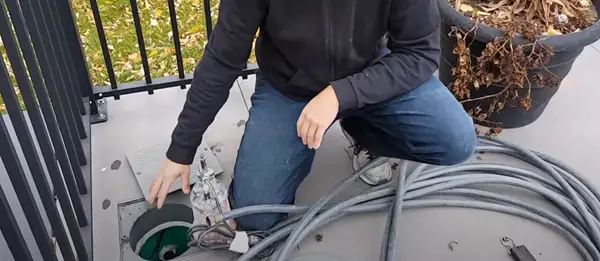Every year when the snow melts and the heavy spring rains come, I cringe thinking about pools popping out of the ground. Of course, the same thing happens on the west coast and the southern and eastern states. Especially during hurricane rains or the heavy rains from the El Niño weather patterns.
Which is why I am writing this article about choosing a swimming pool sump pit pump.
Table of Contents
Pool Sump Pit Pump or Sump Tube Pump?
Many people call the “swimming pool sump pit” a “sump tube.”
Swimming pool sump tubes are so-called because they are a vertical tube (pipe) located next to the pool that extends below ground to the deepest depth level of the pool.
If, like me, you have a basement sump in a sump pit, then I use the term: swimming pool sump pit pump.
A swimming pool sump pit pump needs to be small enough to fit inside of the common 8 inch diameter perforated tube. Also, the on/off switch mechanism has to operate in those tight spaces. That means you cannot use sump pumps with the common vertical float switch or tethered switch.
That is, unless you have a 14 inch diameter or larger sump pit tube. Even then I don’t recommend any sump pump with a float ball type switch. That is because the float ball can easily get stuck in the on or off position and you don’t want to worry about it.
The best pool sump pit pump will have an internal switch or a pressure switch which is activated by water pressure pressing on a diaphragm. So, there isn’t anything that can get tangled in the power cord or discharge hose.
Why Do I Need a Swimming Pool Sump Pit Pump?
An inground swimming pool is just a giant bowl buried in the ground. That bowl will act like a boat and float away if an underground lake forms underneath the pool. So, the pool sump tube pit collects water from around the exterior of the pool and the pool sump pit pump removes the water.
When rain water soaks into the ground it can raise the water table upwards forming that lake under the pool. Without the pool sump pit pump enough water under the pool can cause the pool to pop right out of the ground. Even if the pool doesn’t pop out, the sides of the pool can be severely damaged.
Also, the underground pipes connected to the pool can be broken by the pressure of the water.
The underground water table varies from State to State, city to city, and house to house. When I lived in Homestead Florida the water table was just one foot deep.
Here in Minnesota if you live near a lake, river, or wetlands the water table can be a few feet or many feet deep.
Basements are very common in Minnesota and many of them are dry all winter and need draining during the spring and summer because of changing water table levels.
Unlike pools, basements are never completely waterproof. So, water gets into the basement but it doesn’t push the house out of the ground. However, water pressure will damage the house foundation. Which is why basement sump pumps like the Zoeller M63 sump pump are a necessity.
6 Best Swimming Pool Sump Pit Pump Comparisons
If your swimming pool sump pit diameter is 8 inches you will need to go with a 1/4 HP sump pump in oder for the pump to fit inside of the sump pit tube. The other 1/3HP to 1 HP sump pumps in the table below will fit into a 10 inch sump pit tube.
The Green Expert 1/3HP Sump Pump in the table below has a corded water level sensor. This is not the same as the tethered float switches that I do not recommend using. So, the Green expert sensor can safely hang below the sump pump.












Swimming Pool Sump Pit FAQ
To better understand why and how to use a swimming pool sump pit, I will answer some common questions.
What Is a Swimming Pool Sump Pit? What Does It Do? How Is It Used?
A swimming pool sump pit is a reservoir or container typically installed beneath the ground level of a swimming pool in an area adjacent to the pool. It serves as a collection point for excess water that accumulates below ground around the exterior of the pool. A pool sump pit pump is used to remove the collected water before damage can occur to the swimming pool.
Swimming pool sump pits are typically equipped with sump pumps, which are submerged pumps designed to remove water from the pit and discharge it to a drainage system or appropriate outlet. The pool sump pit pump is activated automatically when the water level in the pit reaches a certain threshold.
Where Is It Placed? How Deep Is the Sump Pit?
The sump pit is usually located near the lowest point in the pool area or in an area where water tends to collect. It may be installed beneath the pool deck, adjacent to the pool, or in a designated drainage area depending on the specific layout and design of the pool.
What Is the Diameter of The Swimming Pool Sump Pit?
The diameter of a swimming pool sump pit can vary based on the size of the pool and the anticipated volume of water that needs to be collected. Common diameters range from 8-10 inches, but larger pits may be required for larger pools or areas with high water accumulation.
Also, larger diameter pool tubes will enable larger sump pumps. Especially those that have vertical float switches. However, as I have said, I do not recommnd tethered or vertical float switches. They can get pinched against the pit tube wall or tangled in the power cord and discharge hose.

How Do I Select the Best Swimming Pool Sump Pit Pump?
The best sump pumps for use inside a swimming pool sump pit are those specifically designed for submersible applications and capable of handling the volume of water expected in the pool environment.
Some popular brands known for their reliability and performance in swimming pool applications include Zoeller, Wayne, and Superior Pump.
It’s essential to choose a sump pump with adequate horsepower, pumping capacity, and durability to meet the specific requirements of the pool and local regulations.

Author at Best Sump Pumps
The first time I helped to install a drain tile and basement sump pump system was 1978.
Since then I have worked for a city water utility where I worked with and maintained pumps.
My rental properties and personal homes all needed sump pumps.
As a modular home dealer/builder, those new homes needed sump pumps.
I put that experience to good use by providing reliable, useful, and practical advice on buying, using, and maintaining sump pumps.
